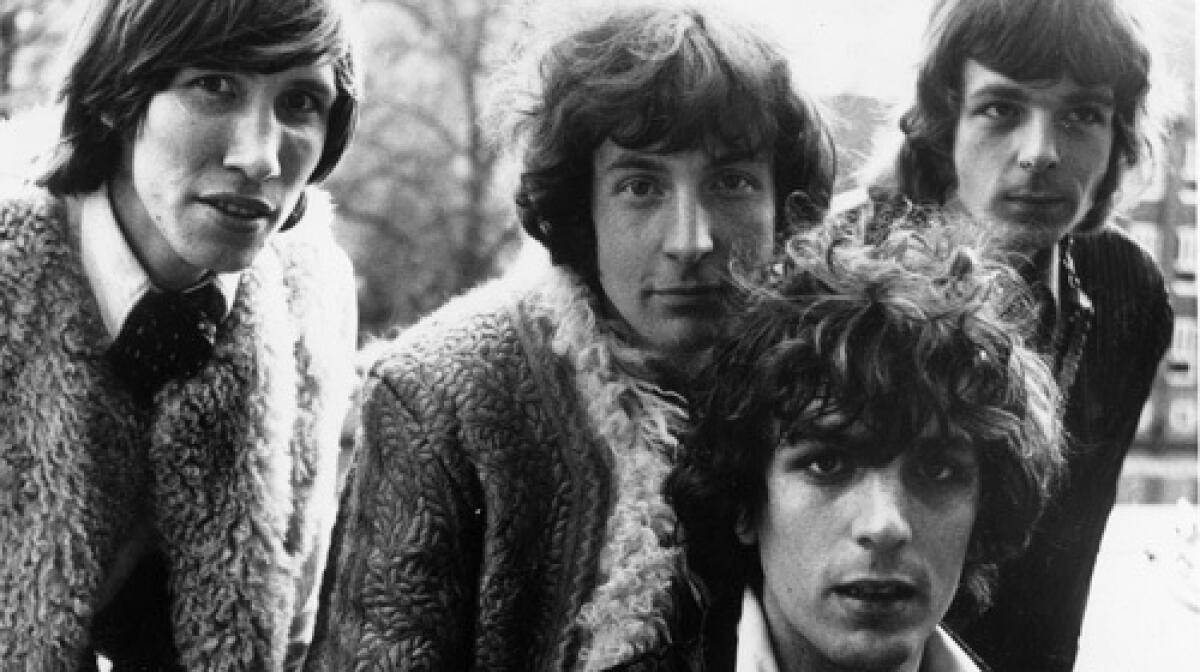Two groups that keep shining on

- Share via
Pink Floyd’s history and entire body of work aren’t as familiar to the average music fan as those of such other 1960s British groups as the Beatles, Rolling Stones or the Who. Even some of Floyd’s casual fans may think of it chiefly in terms of two landmark albums from the 1970s: “The Dark Side of the Moon” and “The Wall.”
The popularity of those collections has been chiefly responsible for giving the band such a strong legacy that a Floyd reunion at Live 8 in 2005 pretty much stole the show from Paul McCartney and U2. Between them, the two albums have spent more than 850 weeks on the U.S. sales chart and sold nearly 40 million copies in the U.S. alone.
FOR THE RECORD:
Pink Floyd: The Backtracking column in Tuesday’s Calendar section reported that Pink Floyd’s “The Dark Side of the Moon” and “The Wall” sold nearly 40 million albums collectively. The figure was based on a Recording Industry Assn. of America certification of 15 million albums shipped for “Dark Side” and 23 million for “The Wall.” But the RIAA gives the band double credit for “The Wall” because it is a double album. That means the individual number of copies of “The Wall” should be about 11.5 million, which in turn means the total sales figure is closer to 30 million. —
The Floyd heritage is so strong that one ex-member’s presence is enough to warrant a headline slot at this year’s Coachella festival, where Roger Waters will re-create “Dark Side.”
The real coup for Coachella would have been to present Waters and Radiohead back to back. Though there are major differences between the two bands, Pink Floyd is mentioned as a reference point for Radiohead so often that a Google search of the two bands turned up more than 600,000 links.
It’s that type of fan base that explains why EMI has taken the ambitious step of releasing a limited-edition boxed set containing all 14 Pink Floyd albums and another boxed set containing all seven of the Radiohead albums released by the conglomerate, including one live collection.
The Pink Floyd box -- titled “Oh by the Way” and housing each album in sleeves featuring original artwork -- sells for around $250, which means you’ve got to be a serious Floyd fan to add it to your collection.
The Radiohead package -- simply named “Radiohead” and containing every album by the British band except the current “In Rainbows” -- goes for around $70.
Pink Floyd
“Oh by the Way”
Capitol/EMI
The back story: Pink Floyd was formed in 1965 and quickly became the center of a fledgling psychedelic rock scene in England, a scene characterized by light shows and long, trippy musical explorations. The core lineup on the debut album consisted of lead guitarist and chief songwriter Syd Barrett, bassist Waters, keyboardist Rick Wright and drummer Nick Mason.
That collection, 1967’s “The Piper at the Gates of Dawn,” was as spacey as its title, with Floyd experimenting sonically in a hazy, drug-laced style that was underscored by such goofy song titles as “Interstellar Overdrive.” The sounds come out of the speakers with such surprising twists and turns that even today the album frequently sounds glorious in its promise of things to come.
But Barrett, who wrote most of the material on “Piper,” fell victim to drugs and left the band in 1968 (he died in 2006), and David Gilmour replaced him. It wasn’t until “The Dark Side of the Moon” in 1973 that Floyd achieved superstar status. That album was a feast of tantalizing sounds that for millions was endlessly fascinating, especially when heard through headphones and in some altered state of consciousness.
“Wish You Were Here,” the band’s 1975 follow-up, was less trippy and less popular, but it stands today as Pink Floyd’s most elegant work -- an album of great emotion and restraint that was in part a tribute to Barrett. “The Wall” in 1979 was another monster seller, but it was a clumsy, heavy-handed concept album. Floyd’s albums since then are of interest only to the faithful. The group split in the early 1980s.
Radiohead
“Radiohead”
Capitol/EMI
The back story: If Pink Floyd started off with enormous promise, Radiohead’s beginning didn’t feel like anything special. “Creep,” a hit single from 1993’s “Pablo Honey” album, seemed at the time like a crude attempt to ride on the coattails of Beck’s slacker anthem “Loser,” though the single has stood up well over time and now is an important part of the band’s catalog.
Thanks to such evocative tracks as “Fake Plastic Trees” and “My Iron Lung” on the superbly crafted second album, “The Bends,” in 1995, Radiohead served notice that it was going to be a contender in rock. And, sure enough, “OK Computer” was a masterpiece -- a 1998 work that set tales of alienation and faith against soundscapes as imaginative and headphone-ready as the best of Pink Floyd.
Since then Radiohead has maintained high standards while moving through different, sometimes less accessible terrain. Singer Thom Yorke, afraid of becoming commonplace, kept pushing the band to make music that addressed some of the same issues as “OK Computer” but abandoned rock’s guitar emphasis and conventional song structures. The group has since slowly moved back toward the “Computer” directness.
Like “Oh by the Way,” the Radiohead set allows you to study the evolution of a band. The difference in Radiohead’s case is that the journey is far more consistently satisfying and far from over.
Backtracking, a biweekly feature, focuses on CD reissues and other pop culture items of historical interest.
More to Read
The biggest entertainment stories
Get our big stories about Hollywood, film, television, music, arts, culture and more right in your inbox as soon as they publish.
You may occasionally receive promotional content from the Los Angeles Times.










